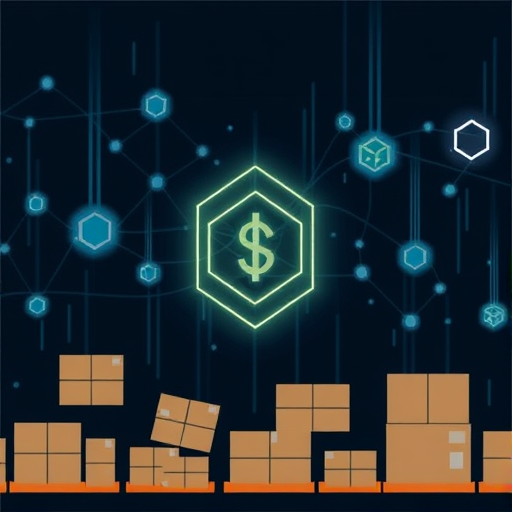Blockchain technology is increasingly being recognized as a powerful tool to enhance supply chain transparency. In essence, blockchain is a decentralized digital ledger that records transactions across many computers in a way that ensures data security, transparency, and immutability. By providing a secure, transparent, and immutable record of transactions, blockchain can significantly improve the traceability and accountability of goods as they move through the supply chain. Here’s how blockchain is shaping the future of supply chain transparency:
1. Improved Traceability and Visibility
Blockchain enables real-time tracking of goods as they move through every stage of the supply chain. Each transaction—whether it’s the creation of a product, a shipment, or a delivery—is recorded on a blockchain. This creates a transparent, auditable trail that can be accessed by authorized parties at any time.
- Why it matters: With blockchain, supply chain stakeholders can track the exact location and status of goods throughout the entire process. This visibility helps prevent fraud, misplacement, and counterfeiting, ensuring products are genuine and delivered as promised.
2. Enhanced Accountability and Reduced Fraud
In traditional supply chains, there are often multiple intermediaries that handle documentation and track goods, which can lead to fraud or mistakes. Blockchain eliminates the need for intermediaries by providing a secure and tamper-proof way to record and verify transactions. Since each block is cryptographically linked to the previous one, it’s virtually impossible to alter the data once it’s recorded.
- Why it matters: This ensures that all parties—whether they’re manufacturers, suppliers, or customers—are held accountable for the quality and authenticity of goods. Blockchain minimizes the risk of fraud, such as the introduction of counterfeit goods or misreported product information, ensuring trust and integrity throughout the supply chain.
3. Smart Contracts for Automation
Blockchain also allows for the use of smart contracts, which are self-executing contracts with the terms of the agreement directly written into code. These contracts automatically execute when predefined conditions are met, without the need for human intervention. In the supply chain, smart contracts can trigger actions such as payment releases, inventory restocking, or shipment notifications once certain criteria are satisfied.
- Why it matters: Smart contracts streamline operations by automating tasks, reducing delays, and cutting down on administrative overhead. This increases efficiency and ensures that transactions are executed accurately, all while maintaining transparency.
4. Authenticity Verification
In industries such as luxury goods, pharmaceuticals, and food, verifying the authenticity of products is crucial. Blockchain allows for the recording of every step of a product’s journey—from raw material sourcing to final delivery—on a secure, immutable ledger. This means that consumers and businesses can verify the origins and authenticity of a product before purchase.
- Why it matters: Blockchain helps combat the growing issue of counterfeit goods by providing a secure and transparent way to verify product origins. For example, a consumer purchasing a high-end watch or a pharmaceutical company looking for proof of drug authenticity can trust the data recorded on the blockchain.
5. Faster and More Secure Payments
Blockchain allows for faster and more secure payment processes in the supply chain. Traditional payment methods can be slow and costly, particularly when dealing with international transactions. Blockchain enables faster cross-border payments by eliminating intermediaries and providing secure, transparent, and immediate transactions.
- Why it matters: Blockchain enhances payment efficiency, reducing transaction costs and processing times. This can improve cash flow for businesses, lower fees for international payments, and streamline the financial aspects of the supply chain.
6. Better Data Integrity
With blockchain, every piece of data entered into the system is recorded in a way that ensures its accuracy and consistency. Because blockchain is immutable, once data is recorded, it cannot be changed or tampered with without leaving a trace. This ensures the integrity of information at every step of the supply chain.
- Why it matters: Accurate data is crucial for supply chain management, as it impacts decision-making, inventory management, demand forecasting, and more. Blockchain ensures that all parties have access to the same reliable information, reducing errors and improving overall supply chain efficiency.
7. Sustainability and Ethical Sourcing
Consumers are increasingly concerned with sustainability and the ethical sourcing of products. Blockchain allows companies to track the origin of raw materials, the environmental impact of manufacturing processes, and the treatment of workers in the supply chain. This information can be recorded on the blockchain, giving consumers access to verified, transparent data about the products they purchase.
- Why it matters: With blockchain, businesses can demonstrate their commitment to sustainability and ethical sourcing by providing verifiable information about their supply chains. This boosts consumer confidence and can enhance a company’s reputation in the marketplace.
8. Supply Chain Resilience
By improving transparency and traceability, blockchain helps build more resilient supply chains. In the event of a disruption—whether due to natural disasters, geopolitical issues, or logistical failures—companies can quickly identify where the breakdown occurred and take corrective action. Blockchain provides a real-time view of the supply chain, making it easier to respond to problems as they arise.
- Why it matters: A transparent and resilient supply chain allows businesses to quickly adapt to changing circumstances, minimizing delays and disruptions. By being able to trace problems back to their source, companies can implement more effective solutions.
9. Regulatory Compliance
Many industries, such as food, pharmaceuticals, and automotive, face stringent regulatory requirements concerning safety, quality, and environmental impact. Blockchain’s ability to securely store and share data helps companies maintain accurate records that can be easily audited by regulators. This reduces the risk of non-compliance and ensures that companies meet industry standards.
- Why it matters: Blockchain helps ensure that companies comply with regulatory standards by providing an immutable, transparent record of all transactions. This reduces the burden of record-keeping and simplifies the auditing process, helping businesses avoid legal and financial penalties.
10. Cost Reduction
By reducing the need for intermediaries, paperwork, and manual data entry, blockchain can significantly lower operational costs. The transparency and automation provided by blockchain help reduce inefficiencies and errors, streamlining the overall supply chain process.
- Why it matters: Blockchain helps businesses save time and money by eliminating costly intermediaries, reducing fraud, and automating tasks. This cost-saving can be passed on to consumers, making products more affordable and competitive in the market.





